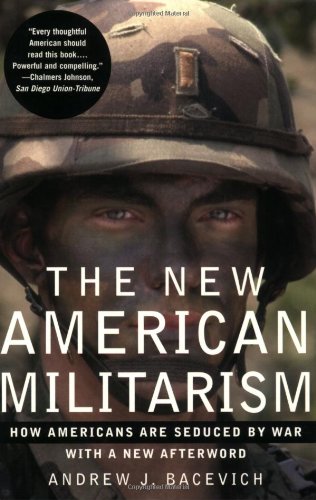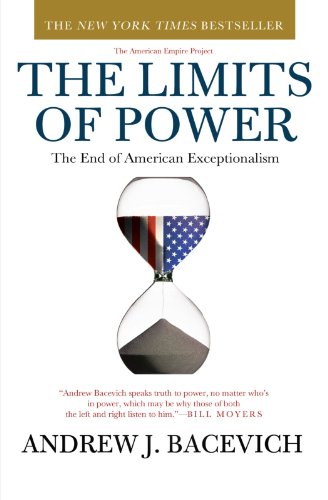Andrew Bacevich describes America as an "unserious empire." He corrected his PBS interviewer who had offered the more commonly heard phrase "reluctant empire" as a way to think about our country. Evidently there is concurrence of American political thought that America is indeed an empire, legitimate debate limited only to the qualifier.
Before examining our unserious empire, it might be interesting to see why it is that being "reluctant" is more acceptable to Americans at war than being unserious. If I am a reluctant bride or a reluctant student, the implication is that I am forced to do something by the stronger party in a husband/wife or teacher/student relationship. "Reluctant" implies that the doer of the deed wants something different, and in marshalling their limited autonomy, is trying to avoid the sin perceived.
Clearly, the United States is in no way a reluctant empire.
Many Americans operate blind to the machinations of American foreign policy. Of those who do pay attention, most miss, or are unaware, of the fundamental context of American empire. For example, a poll last May indicated that 87% of Americans are "concerned about the security of nuclear weapons in Pakistan" as Taliban fundamentalism gains popularity there. Forget for a moment the role of American anti-communist policy in the proliferation of nuclear weapons in India and Pakistan. Please ignore the hundreds of billions of dollars in military and political aid granted Pakistan in the modern era. Kindly disregard the history of American involvement in Pakistani politics, invariably supporting U.S. compliant and corrupt military dictatorships and working diligently to destabilize and threaten elected, less controllable Pakistani leaders. US intelligence agencies and our Pakistani dictator at the time immediately blamed the 2007 assassination of electoral hopeful Benazir Bhutto on former US ally and anti-communist partner, the infamous Taliban. The specific culprit, Baitullah Mehsud, was reported killed a few months later by a US drone strike in South Waziristan. Naturally, crazy conspiracy nuts like the late Robert Novak suggest that Benazir’s murder carried no trademark of al Qaeda, and by extension, the even less sophisticated Taliban. Instead, Novak and others point to US interests, foreknowledge and involvement.
 The New American Milit...
Best Price: $0.10
Buy New $8.98
(as of 10:50 UTC - Details)
The New American Milit...
Best Price: $0.10
Buy New $8.98
(as of 10:50 UTC - Details)
Uninformed people might consider "incompetent" as a more suitable adjective for our empire. Nincompoopery might also seem to apply.
But we cannot use incompetent, idiotic, or reluctant to describe our modern global empire. Each of these terms imply that if only our empire was competent, if only it was more intelligent or thoughtful, if only it were more willing to embrace its familial or educational responsibilities, the empire would work, be worthwhile, and pay off. While "unserious" works, it still suggests that if we were serious, we could improve the empire.
What if, for all the noise, the American empire was doing exactly what it was designed to do? What if, like a loose pit bull in a trailer park or a well-trained truffle hunting pig at work, our unending wars and the silly yet revealing acronym of COIN were part of something that looks scary and strange, but works very well for the actual participants?
 The Limits of Power: T...
Best Price: $1.10
Buy New $6.80
(as of 11:15 UTC - Details)
The Limits of Power: T...
Best Price: $1.10
Buy New $6.80
(as of 11:15 UTC - Details)
Bacevich, in his excellent interview, makes several points that are worth thinking about. He notes that COIN ops in Vietnam, ten years after they were launched, had destroyed the US Army from within — an Army filled with enlisted draftees and young officers who were on the whole better educated, more reflective, and less well paid than the volunteers who fill today’s Army. By 2008, the so-called military—civilian pay gap had been long closed. Today, in the wake of an ill-kept recession lengthening and deepening each week, military pay far exceeds that available to inevitably poorly educated high school graduates in the civilian world. These modern soldiers are not reading much, including Army Field Manual 3-24 (perhaps the Army will make a video or a graphic novel to explain it). Current soldiers see their future civilian employment options ranging from grim to downright depressing. There is no need for a Fugitive Slave Act, or a draft, when our American helots recognize that they have no place to go. The officers who do not leave early, stay on for pay as well, biding their moral instincts and their time for 20 or 25 years. Does the military on the ground really believe in COIN? Or is it just the politicians and the media?
Bacevich also notes with surprise that the generals offer both the public and their presidents COIN and indefinite extended occupations as the only option, everywhere. The much ballyhooed delay in the Obama decision … wait for it… to approve the COIN approach with a surge of more troops belied the fact that his generals gave him no real alternatives. Bacevich suggests that a responsible president would insist on being offered real alternatives, as opposed to be told what to do. But what if it’s all good, because our empire is working as intended?
Bacevich asks, as I do, how can we afford to maintain, much less grow, the empire? With a current debt load approaching 100% of GDP, can the US empire even get serious? And what would "more" serious look like?
 War is a Racket: The A...
Best Price: $2.55
Buy New $7.01
(as of 05:45 UTC - Details)
War is a Racket: The A...
Best Price: $2.55
Buy New $7.01
(as of 05:45 UTC - Details)
The answer — as with many things — is simple if one achieves the appropriate perspective. To explain not one, but two decades of American war, conducted aggressively since the collapse of the USSR by four different American presidents, two Republicans and two Democrats, punctuated for the mass public with spikes of "war" activity and intelligence alarms, the most workable perspective is gained by simply following the money. Some argue that Iraq and Afghanistan weren’t about oil and gas because they weren’t about owning real estate and doing the hard work of getting oil out of the ground, or actually building wealth through transportation links and pipeline construction. Instead, our wars and ongoing occupations have produced corruption and waste rather than real capital development and human productivity in the distant warzones. Regular people who work honestly for a living, who understand wealth creation on a human scale — and consequently are not overly interested in debt/equity swaps and credit default insurance used by politically connected banks and investment firms — regular people don’t intuitively see how waste, corruption and chaos can be a good thing.
Murder, too, for that matter — it’s all good and useful if it creates demand for government subsidy of, and government spending on, things our war-fighting, intelligence, security and nation-building industries produce. Our empire is working well if it contributes to shortages that politically connected financial industries can bet on, especially with politically-derived insider information. Anything that increases the perceived need for centralized American government — at home and abroad — for certain groups of beneficiaries is nothing but a good thing.
 Americans themselves may be reluctant about empire, even as we are married to it, pay for it, and have no real political ability to alter or abolish it. But the American empire is neither reluctant nor unserious. Obama and the American political class, Republican and Democrat, understand completely that without the continued sustenance of the American empire, the American central government as it now exists will not — and cannot — survive.
Americans themselves may be reluctant about empire, even as we are married to it, pay for it, and have no real political ability to alter or abolish it. But the American empire is neither reluctant nor unserious. Obama and the American political class, Republican and Democrat, understand completely that without the continued sustenance of the American empire, the American central government as it now exists will not — and cannot — survive.
I commend Bacevich for his conservative and correct questioning of empire, much as many of the so-called left have questioned it. But as a third decade of imperial war dawns, in the midst of looming national bankruptcy, the willingness and the capability of the US federal government to defend its interests has never been more serious. However, in the spirit of this website and another bright new year, I can only say, "Bring it!"




